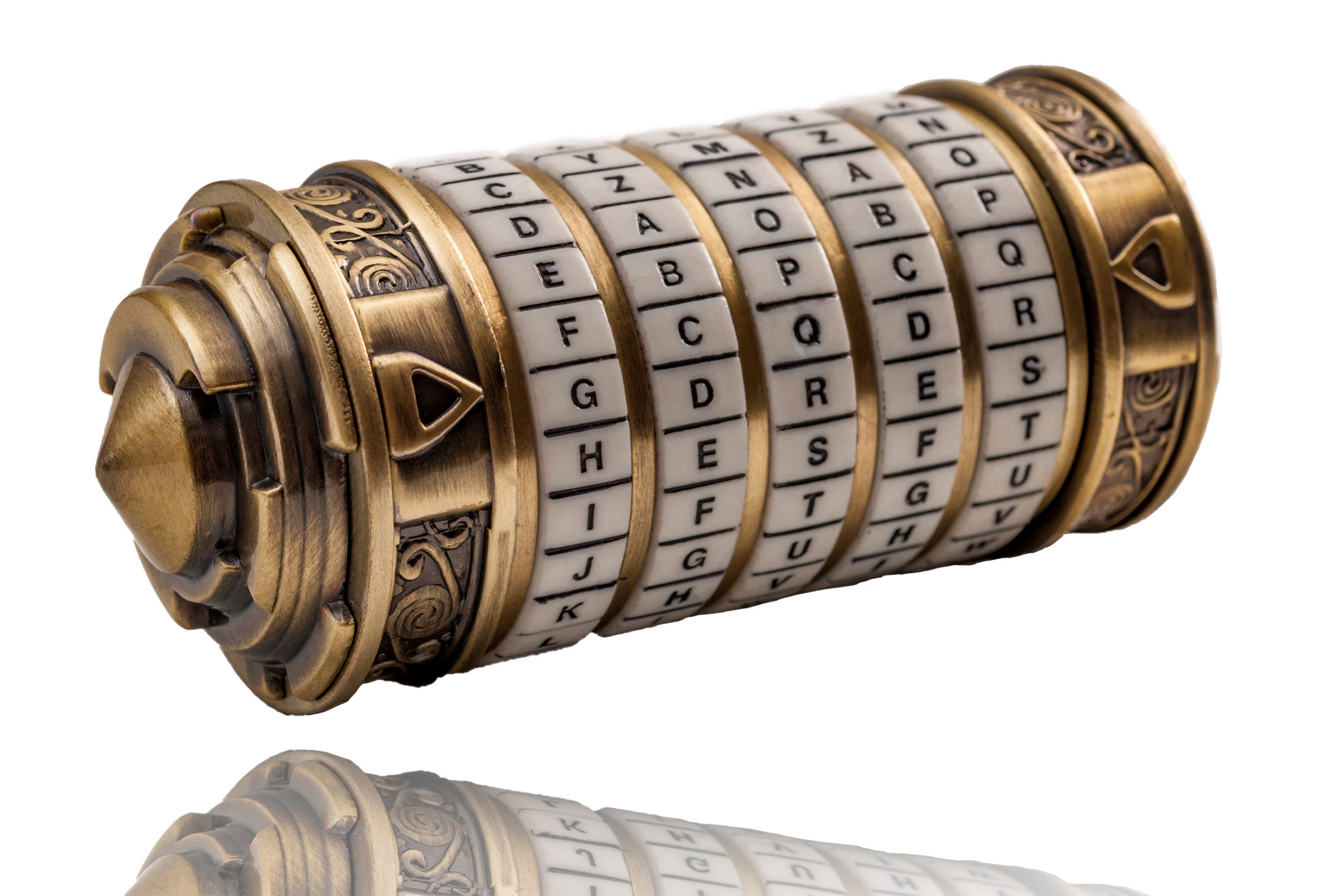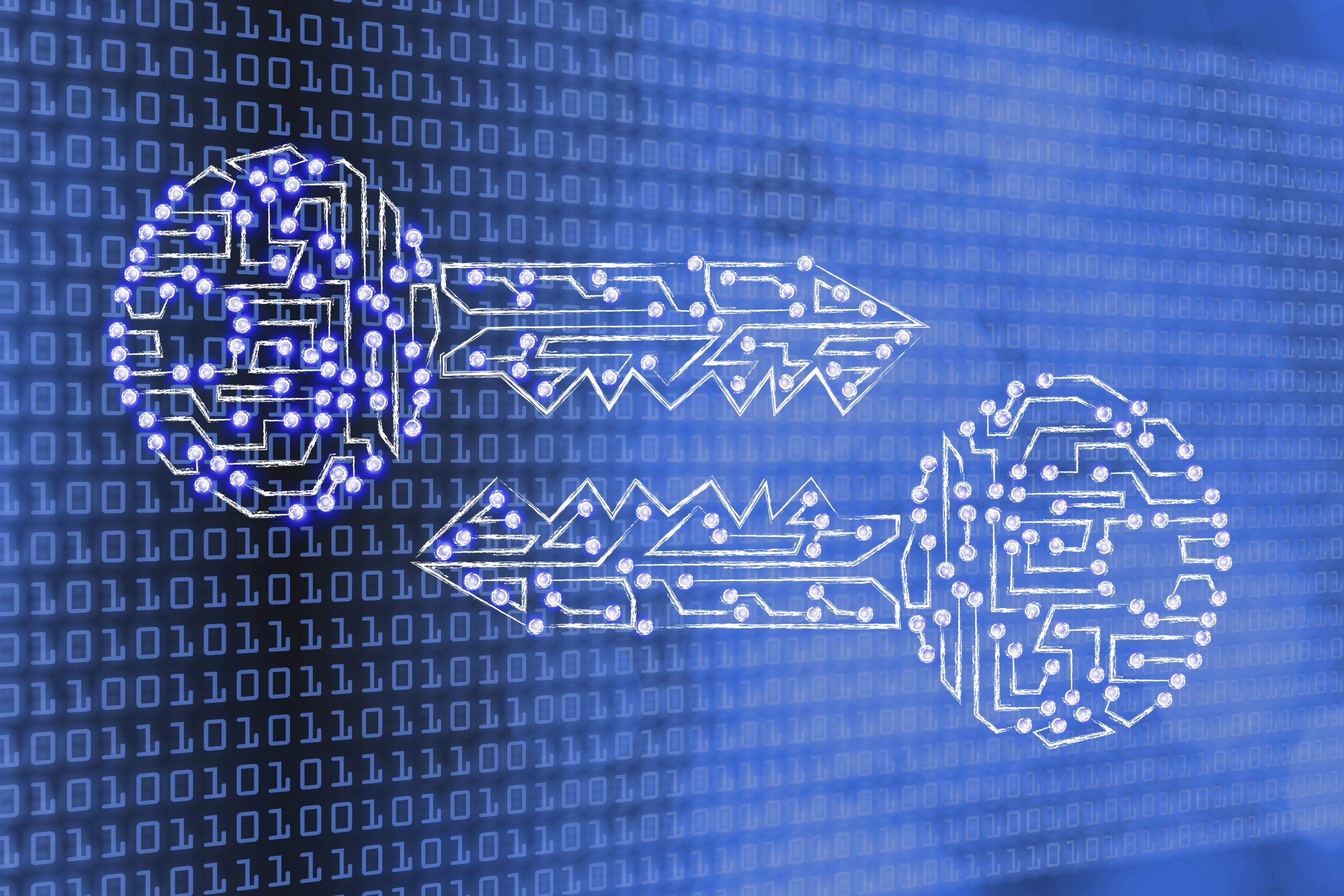Encryption algorithms, digital signatures and a private key are just a few of the safeguards cryptographers use to protect sensitive data in databases, online and in other digital environments. If you’re interested in becoming a cryptographer, you might wonder how to go about preparing for this new career path. Becoming a cryptographer requires a formal college education, as well as years of experience in a related field. Advanced degrees are fairly common in this career field, especially among industry leaders in cryptography.
What Is Cryptography?
Officially, cryptography refers to the field concerned with keeping communications private and secure through the use of codes. Low-tech, traditional methods of cryptography involve codes in which the letters in a message have been encrypted, or replaced with other letters, numbers or symbols. Decoding an encrypted message requires the use of a table or grid that shows what symbol translates to the real letter to be read. You can think of a cryptographer as both a message decoder and an expert in coding messages to keep sensitive data secure.

In the digital age, cryptography usually goes hand in hand with computer science and information technology. Cryptographers use coding, or computer programming, to keep computer networks and the digital data stored within them safe from cyber attackers. Encryption algorithms are used to encrypt data that includes sensitive information like financial data, military data and other information pertaining to national security and similarly important matters.
RELATED: What Can I Do With a Cyber Security Degree?
Despite its close relationship with computer science, cryptography is based on the theories, principles and concepts of mathematics. In fact, the United States Bureau of Labor Statistics (BLS) categorizes cryptographer, cryptologist, cryptanalyst and cryptographic vulnerability analyst as mathematician careers rather than computer and information technology careers. As such, math skills are, understandably, critical to career paths in cryptography. Analytical skills are also critical if you plan to make cryptography your new career.
Technical skills are important, but cryptographers also need soft skills like strong critical-thinking and problem-solving capabilities, good judgment and integrity. Another type of soft skills that are important when you become a cryptographer are communication skills. Good cryptographers develop the ability to explain technical concepts to non-technical professionals, some of whom may not even have a basic understanding of how computer cybersecurity systems work.
Additionally, having some knowledge of a foreign language may also be valuable for cryptographers, since the data being decoded may appear in the form of foreign communication signals.
Professional work experience is another common requirement for becoming a cryptographer. Many jobs in cryptography require quite a few years of experience working in the field of information security solutions or in other information technology occupations.
Coursework in a Cryptography Degree Program
To become a cryptographer, you’re going to need a college education in a technical course of study. Non-technical degrees don’t have the math- and computer-heavy curriculum needed to prepare students for a new career in cryptography.
RELATED: Highest Paying Degrees in Cyber Security – Majors & Careers
In any degree program that pertains to the study of cryptography, students should strive to develop a basic understanding of each of the disciplines that make up this field: computer science, mathematical sciences and information security. Together, these disciplines teach students the skills needed to encrypt data by creating complex computerized codes and decode the messages embedded in these codes.
In particular, students should learn the methods of both symmetric encryption, which uses a single key or secret to decode the secure data, and asymmetric encryption, which uses a pair of keys. Students pursuing any sort of cryptography degree must learn data structures and mathematical algorithms, or formulas, such as cryptographic hash functions. To determine the origin of a message and verify that it came from the source it was supposed to have come from, cryptographers use short pieces of information such as message authentication codes and digital signatures.

Computer Science
Technical topics of study, like data structures and algorithms, are a big part of the study of computer science. The curriculum of a degree in computer science encompasses technical computer skills, like the use of programming languages in coding, and the mathematical foundations of computation.
RELATED: What Kind of Computer Degree Is Most Helpful in Getting a Job in Cyber Security?
Some students come to the field from a background in computer engineering, a field of electrical and electronic engineering. Computer engineering encompasses both hardware and software design and development.
Mathematical Sciences
Math skills are critical for the study of cryptography, so you should be prepared to take math classes if you want to become a cryptographer. Aspiring cryptographers should take courses in discrete mathematics, linear algebra, matrix algebra, probability and statistics, number theory, group theory and finite field theory.
Information Security
Keeping data secure is the key purpose of the field of information security. Data encryption is just one of the possible security solutions at the disposal of cybersecurity professionals. The field of information security encompasses everything from cyber law and policy to malware analysis, digital forensics and the principles of ethical hacking.
RELATED: The 20 Best Masters in Cyber Security Online
Other Programs of Study for Work in Cryptography
Students don’t always come to the field of cryptography with a degree in this specific area of focus. In fact, programs of study devoted strictly to cryptography can be difficult to find, especially at undergraduate levels. Instead, students may major in any of the programs of study related to this field as they begin working to become a cryptographer.
RELATED: What Is the Benefit of a Degree in Cybersecurity vs. Network Security?
Students from a math-focused background often start out with a bachelor’s degree in mathematics, applied mathematics or applied mathematical sciences. A major like data science or data analysis is another math-heavy option that may prepare students for a cryptographer career path.
For students who are more interested in the computer technology aspect of the field of modern cryptography, a degree in computer science may be ideal. Through this degree, students can gain knowledge of the mathematical models and principles from which computer algorithms arise, as well as develop their familiarity with the use of various computer programming languages. If it’s the security aspect of cryptography that you find most interesting, you might instead opt to major in information security or cybersecurity.
Ultimately, the name of the program of study that appears on your degree matters less than the competence and technical skills you cultivate as you pursue your degree. Aspiring cryptographers are encouraged to strategically use their elective to build a base of knowledge in each of the areas that contribute to the interdisciplinary field of cryptography and to apply for internships through which they can gain real-world experience in data encryption.

Cryptography Jobs With an Associate’s Degree
If you have only an associate’s degree, your career options in fields related to cryptography will be limited. You will most likely be looking at positions like cybersecurity specialist, cybersecurity technician, security analyst or officer or cyber data analyst. You typically won’t have the opportunity to specialize in cryptanalysis or handle high-level matters of data encryption and decryption, since those job duties would belong to professionals with a more advanced level of education.
Associate’s degree options for cryptography include programs in cybersecurity, computer security, cyber defense, information assurance and even digital forensics.
Job Opportunities With a Cryptography Bachelor’s Degree
Most jobs in cryptography and cryptanalysis require at least a bachelor’s degree, if not a more advanced education. With this level of education, you may qualify for specialized roles like cryptography expert, cybersecurity engineer, cryptography analyst, cryptography risk manager and cryptography research associate. Alternatively, you could work in less specialized capacities in job roles like security engineer and software engineer.
The extent to which your job duties are specifically related to cryptography may vary depending on which of these roles you possess. A security engineer will spend less time working with encryption algorithms specifically and more time focusing on the general cybersecurity systems intended to secure data from cyberthreats. A software engineer may have little to do with cryptography, using their mathematics, computer and engineering knowledge to create the source code that builds computer systems and software. Cryptography and cybersecurity-focused roles will typically involve more work that pertains to using an encryption algorithm or private key to encrypt data and decrypt information.
Degree programs at this level still aren’t as specialized as those available at the master’s degree and doctoral levels. Students pursuing a bachelor’s degree are still likely to pursue a degree in a more general major such as computer science, computer security or mathematics. However, some schools offer more specialized programs of study, like a cryptography concentration in an applied mathematics program and an undergraduate certificate in cryptology.
Careers With a Master’s Degree or a Doctorate Degree in Cryptography
An advanced degree, like a master’s degree or a doctorate, can help you reach advanced career roles in the field of cryptography. For example, you could leverage your master’s-level education or doctoral degree to attain a senior-level cryptography career. Career options with a graduate or doctoral degree may include manager and program director roles in cryptography. A doctorate is crucial if you want to work in academic research roles and in certain other high-level cryptography careers.
How Do Cryptographers Maintain Subject Matter Expertise?
Sooner or later, cryptanalysts end their formal college studies – but cyber security systems and cyber threats continue to evolve. Continuous learning even after completing their degrees is essential for cryptographers and others working in the field of cyber security.
Over the course of a successful career in cryptography, professionals in this field must keep abreast of changes in their field. They may do this through certificate and non-degree courses and through courses and papers published by industry journals and professional organizations. For example, the EC-Council, also known as the International Council of Electronic Commerce Consultants – the organization behind the Certified Ethical Hacker credential – currently offers cryptography training through a Cryptography Skill Pack.

Where Can You Work With a Cryptography Degree?
What kind of company is likely to hire cryptographers? A cryptographer is essentially an encryption expert, which opens up their opportunities for employment to any industry or employer who may need to keep data on a computer network private and secure through encryption code. Some of the main industries in which cryptographers work include the government, financial institutions and the computer and information technology industry.
Cryptographer Jobs With the Government
Many cryptographers work in government security, intelligence and law enforcement agencies. Jobs in government agencies can be particularly satisfying, since the cryptographer knows they are using their skills to protect national security.
National Security Agency
Perhaps the noblest job role in which you can put your skills in cryptography to work is protecting national security. The National Security Agency (NSA) is one of the federal government agencies that is widely known for hiring cryptographers and engaging in classified work on encryption.
Of particular interest to aspiring cryptographers is the National Security Agency’s math-focused job role of cryptanalytic diagnostician. In this role, government employees at the National Security Agency use mathematical models and terms to express cryptographic data and problems and work to analyze and decode or decrypt signals using cryptanalytic techniques and tools, some of which they develop themselves.
Federal Bureau of Investigations
The Federal Bureau of Investigations (FBI) Laboratory is home to some of the best cryptologists, cryptanalysts and cryptanalyst forensic examiners in the country. The FBI devotes an entire unit – the Cryptanalysis and Racketeering Records Unit (CRRU) – to the professional practice of cryptography in the service of federal law enforcement and intelligence.
FBI cryptanalysts perform decryption of electronic and non-electronic communications, including letters, ledgers and diaries that are believed to pertain to matters of organized crime, violent crime and terrorism. In 2022, the Department of Justice announced the formation of a specialized FBI team, the National Cryptocurrency Enforcement Team, that would be responsible for investigating matters involving the misuse of digital assets like cryptocurrency to facilitate crimes that include money laundering, drug trafficking, cyberattacks and other forms of theft.
The FBI has historically published code-cracking challenges for the general public through which prospective cryptographers can attempt to test their decoding skills.
Central Intelligence Agency
Encryption systems are part of the scope of work you might perform as a Cyber Security Officer for the Central Intelligence Agency (CIA). CIA Cyber Security Officers are involved in all types of information technology systems and threats.
Cryptography Jobs in the Financial Sector
Much of the data that requires encryption to stay secure is either financial data like credit card numbers or the sort of sensitive data needed to confirm your identity. As such, financial institutions and other companies and organizations in the financial sector are prime targets for cybercriminals – and thus, prime places of employment for experts in encryption.
Potential job titles to look for in the financial sector include cryptography analyst, applied cryptographer, cryptographic engineer, cryptography manager and cryptography risk manager.
Information Technology Jobs in Cryptography
All jobs in modern cryptography pertain to technology, but not all cryptographers are employed in the IT industry. However, the information technology industry has plenty of need for skilled cryptographers and other experts in cybersecurity. Information technology occupations that pertain to cryptography exist in software development companies, IT services and IT consulting companies, computer circuit companies and cryptography startup companies, among others.
If you’re wondering what kind of earning potential cryptographers have, you’re in for good news. The average cryptographer salary as of 2021 was upwards of $145,000, according to Western Governors University. While a lucrative salary isn’t everything, if you’re already thinking that you may want to become a cryptographer, this salary data will likely encourage your career plans.
Related Resources:
What Is the Benefit of a Computer Hardware Engineering Degree Vs a Computer Programming Degree?
What Degree Do People With a Job in Computer Engineering Have?
Which Degree Is Best for a Software Engineer?
What Degree Do I Need to Be an Intelligence Analyst?
What Degree Do I Need to Be a Computer Technician?
For Further Reading:
